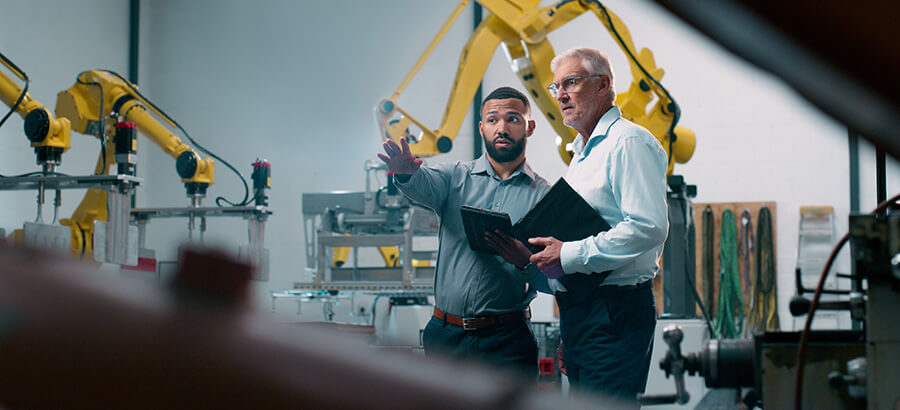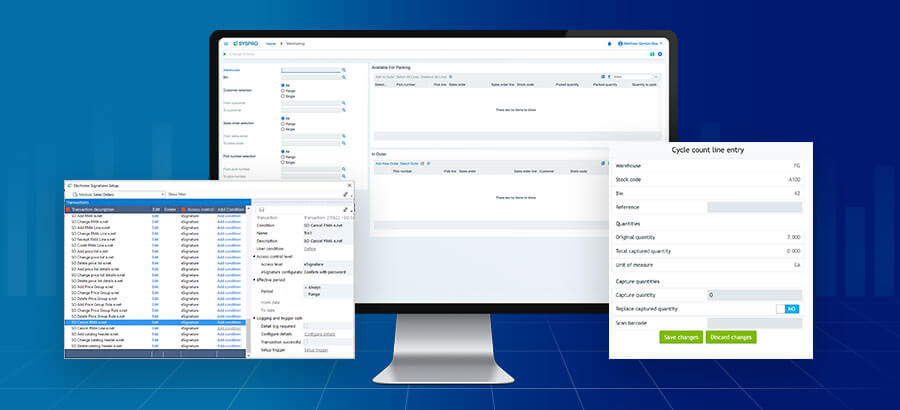As we move into a new year, we look forward to how ERP software will innovate for companies to capture benefits across their value chain. These advances will be seen not only in transformational digital technologies, but also in solutions for new ways of working, business decision-making, and automation of manual, routine workloads. While there will be many innovations in 2023, here are eight trends for manufacturers to focus on when planning their digital future.
1. Devices and IIoT with ERP
In manufacturing, a new wave of devices and tools that communicate with each other will create new opportunities to achieve higher levels of automation. The interconnectivity of devices will generate huge amounts of data via the Industrial Internet of Things (IIoT).
ERP systems will be critical because all that data can be stored and then output as dashboards and reports that will enable analysis to improve processes and cut costs. This will give companies access to real-time machine performance monitoring from any location.
Via their ERP system, operators and supervisors will have both historical and real-time views of any production machine. Reports will also be used to monitor the health and condition of production assets, making predictive maintenance more effective so extending equipment lifespans, and ensuring higher-quality outputs.
2. Cloud ERP
The adoption of cloud computing is an important component for enabling IIoT in ERP. IIoT is a framework for smart machines with embedded sensors and network connectivity. The cloud allows this framework to collect, send, and receive data without any manual intervention and cloud ERP is the single place to collect, streamline, and leverage it.
3. Integration becomes more important
Moving to the cloud, accessing data from smart devices, linking to machines and with AI technologies, and sharing information with partners means one thing will be supremely important — integration. The ability of an ERP system to provide seamless and easy integration to any connecting protocol can help, or hinder, a manufacturer’s path to greater digital transformation.
4. Supply chain information and collaboration
Many industries are still plagued by supply chain issues. According an IDC report on industry ecosystems, the industry landscape is too complex, dynamic, and disruptive for any manufacturer to address on its own, and it is difficult for one organization to keep up with the pace of innovation. Expansion and collaboration with partners will become the next phase of digital transformation. Consequently, IDC believe that organizations which share data, applications, or operations with their partners through joint ventures will be able to increase profitability.
ERP solutions will enable customer and supplier portals, empowering manufacturers to improve information sharing and for communicating about product details, specifications, delivery, and status of service.
5. Role of artificial intelligence (AI) and ERP
At the end of 2022, the release of ChatGPT, a natural language processing tool driven by AI technology, showed how AI could be used more generally for understanding problems. It points to how humans will increasingly share their work with intelligent machines. ERP applications will increasingly embed AI into their solutions so that better and quicker decisions can be made to optimize processes and improve product quality and delivery. A major effect of this will be in the skills that companies require in the future. Companies will not only need to recruit the skills, but also re-skill and up-skill their staff to handle the organization of the future.
6. Remote access, anywhere, anytime
With interconnected devices, access to data and cloud computing, ERP systems will ensure support for remote computing. Manufacturing staff will therefore be able to access information about machines, assess their performance, and view insights remotely – anytime, anywhere.
7. Cybersecurity
The interconnectivity of devices, machines and applications will make an ERP system even more important for the protection of data. An ERP solution can help to provide protection for the data that is being tracked and communicated by devices and other applications.
8. ESG reporting with ERP
With the world showing increasing concern for climate and other environmental disasters, investors and consumers will prefer businesses with the right environmental and social credentials. In 2023, companies will use the environmental, social, and governance (ESG) reporting capabilities in their ERP system to provide accurate, timely, and verifiable reports for stakeholders.
From inertia to action
As ERP systems deliver transformational digital solutions that enable new ways of working, businesses will need to be more adaptive. The concept of “digital Darwinism” is that businesses must adapt to the pace at which technology influences how society and commerce evolve. To do this, businesses must move from inertia to action.
In manufacturing, this means:
- realizing the importance of data-driven decision-making to improve operations and optimize production;
- increasing the use of digital platforms and technologies to enable more efficient and flexible operations;
- adopting practices and technologies that encourage collaboration and information sharing across the business ecosystem;
- embracing the growing trend toward sustainability and the use of eco-friendly materials and processes;
- understanding the role and value of a future-oriented ERP system to both support and achieve these changes.






